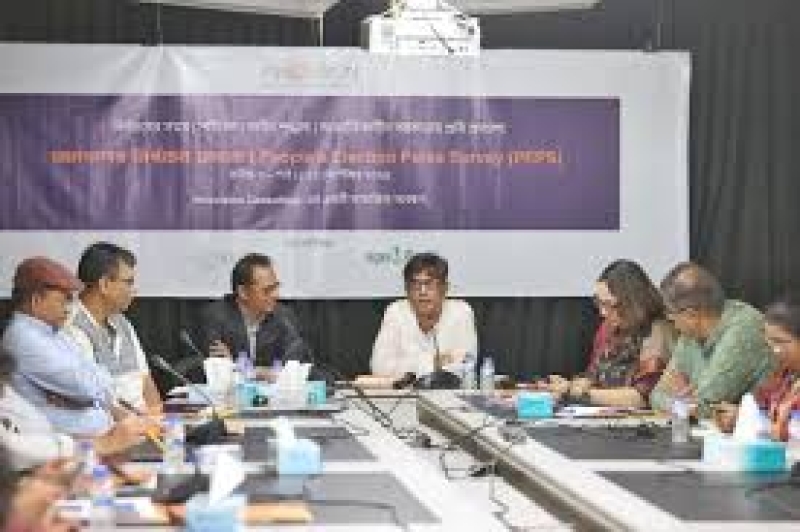- Govt reaffirms commitment to distribute school books by Jan |
- Dhaka’s air turns ‘unhealthy’ on Sunday morning |
- BD’s leather sector stuck at $1bn; could tap $5bn: Experts |
- RU suspends ward quota reinstatement amid student protests |
- Airports across Europe face disruptions due to cyberattack |
78pc Bangladeshis Satisfied With Interim Govt: Survey

Shafiqul Alam, Press Secretary to the Chief Adviser, speaking at the roundtable on 21 September 2025 in Dhaka.
More than 78 per cent of Bangladeshi citizens are satisfied with the performance of the interim government led by Chief Adviser Professor Muhammad Yunus, according to a nationwide survey unveiled on Sunday.
The survey, titled People’s Election Pulse Survey (PEPS), was conducted by private consultancy firm Innovision Consulting in collaboration with civic platforms BRAIN and Voice for Reform. It aimed to capture citizens’ opinions on the interim administration, electoral prospects, and broader governance issues.
The findings were disclosed at a roundtable held at The Daily Star Centre in the capital. Md. Rubaiyath Sarwar, Managing Director of Innovision Consulting, presented the results, while Shafiqul Alam, Press Secretary to the Chief Adviser, attended as chief guest.
Scope of the survey
Organisers reported that the survey was conducted between 2 and 15 September 2025, covering all 64 districts of Bangladesh and involving 10,413 respondents. Participants from diverse backgrounds and age groups were interviewed in person, allowing for an extensive overview of public sentiment.
The questionnaire focused on six key areas: the performance of the interim government, perceptions of impartial elections, the electoral environment, law and order, timing of the elections, and voter turnout.
Public satisfaction
The results indicated that 78.7 per cent of respondents were satisfied with the interim government’s performance. Of these, 39.5 per cent rated its performance as “good”, while 39.2 per cent described it as “moderate”.
Generational analysis revealed varying levels of approval. Among Gen Z respondents (aged 18–28), 34.7 per cent rated the government’s performance as “good”. This figure rose to 41.3 per cent among millennials (29–44), 42.9 per cent for Gen X (45–60), 44 per cent for Boomers II (61–70), 47.1 per cent for Boomers I (71–79), and 52.8 per cent for post-war plus respondents aged above 80.
Educational background also played a role in shaping opinions. Only 31.2 per cent of graduates described the government’s performance as “good”, compared to 46.2 per cent of respondents with no schooling or pre-primary education.
Remarks from the Press Secretary
Commenting on the findings, Press Secretary Shafiqul Alam said that the nearly 80 per cent approval rating in the 14th month of the interim government highlighted widespread satisfaction.
“There is no doubt about it,” he said, stressing that people across the country are eager for elections. He reiterated the Chief Adviser’s assurance that the polls would be held in February 2026. “Nearly 95 per cent of people are hopeful. No one will be able to cast doubt on the election.”
Panel discussion
The roundtable also featured prominent speakers, including BNP Chairperson’s special assistant for foreign affairs Saimum Parvez, Supreme Court lawyer Rasna Imam, Voice for Reform co-convener Fahim Mashroor, BRAIN Executive Director Shafiqur Rahman, and Rastra Songskar Andolan (State Reform Movement) leader Syed Hasib Uddin Hossain.
The panellists shared their perspectives on the survey findings and the broader implications for Bangladesh’s political landscape. Many noted that while the interim government enjoys public approval, ensuring a transparent and inclusive electoral process will be key to sustaining confidence.
Outlook
With elections scheduled for February, the survey indicates a cautious optimism among citizens. The widespread approval of the interim government, combined with strong public demand for fair polls, suggests that Bangladesh is heading towards a crucial democratic transition.

